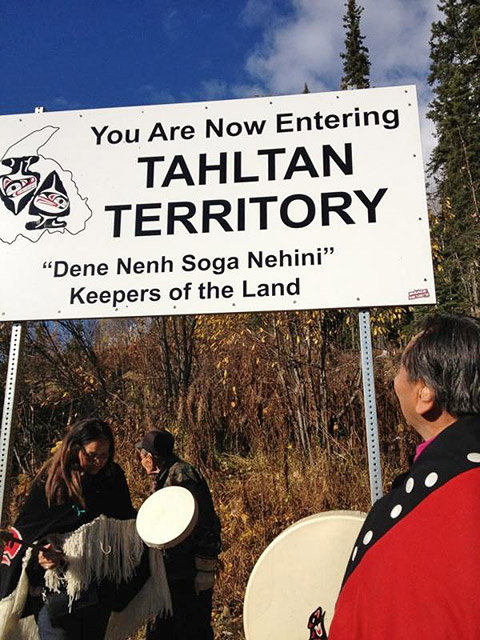|
| |
| 23. Dezember 2012 |
Shell gibt sein Klappan-Projekt in den Sacred Headwaters auf.
Tahltan First Nation erringt großen Sieg über den Shell-Konzern |
| |
| Der unermüdliche Kampf der Tahltan First Nation gegen den Shell-Konzern und für den Erhalt ihres traditionellen Territoriums in den Sacred Headwaters, den unantastbaren Quellgebieten von Stikine/Iskut, Skeena und Nass River hat sich gelohnt: Am 18. Dezember 2012 erklärte Shell, sein Klappan-Projekt, die Methangasgewinnung aus Kohleflözen nach der Fracking-Methode, endgültig aufzugeben. In einer gemeinsamen Presseerklärung des Ministry of Energy, Mines and Natural Gas, Shell Canada und des Tahltan Central Council heißt es: „As part of a tripartite agreement, Shell Canada is immediately withdrawing plans to explore for natural gas in the Klappan by relinquishing its tenures. In addition, the Province of British Columbia will not issue future petroleum and natural-gas tenure in the area. A separate agreement between government and industry will also lead to a new water recycling project – to be built by Shell – through the issuance of $20 million in royalty credits support by the Province of B.C. The terms of this arrangement were agreed upon between government and Shell in recognition of the lost, upfront capital spent by the company, in addition to rent payments already paid to the Crown on the Klappan tenures. … The tripartite agreement represents a step forward in discussions between the Province of British Columbia and the TCC, with support from the Tahltan and Iskut Band councils, about the long-term future of the Klappan area.“ |
| Das Tahltan-Territorium liegt im Norden von BC, es ist 93.500 km² groß. Im Norden und Westen grenzt es an Alaska, es umfasst Teile des Yukon, im Süden und Osten liegen die oberen Nebenflüsse des Nass und die westliche Hälfte des Stikine-Plateaus, einschließlich der Sacred Headwaters. Die Tahltan First Nation umfasst etwa 2.500 Menschen, die Hauptsiedlungen sind Telegraph Creek, Dease Lake und Iskut. Die traditionelle Sprache ist Na-Dene (Athabascan). |
| |
 |
| Elchbulle zu Beginn des Herbstes, das Geweih ist noch mit Bast überzogen |
© Klaus Pommerenke |
|
| |
| 2004 hatte Shell Canada, Teil des weltweiten Royal Dutch Shell-Imperiums, von der Provinzregierung von BC die Rechte erhalten, in einem 4.000 km² großen Gebiet innerhalb des traditionellen Territoriums der Tahltan First Nation Bohrungen vorzunehmen, um Methangas aus Kohleflözen zu gewinnen. Drei Bohrungen wurden durchgeführt, doch dann stoppte der Widerstand der First Nations weitere Erkundungen. Mit aller Macht versuchte Shell, den Widerstand der Iskut und Tahltan First Nations zu brechen, Stammesmitglieder wurden verhaftet, mutige Großmütter in Arrest genommen, Straßenblockaden geräumt, immense Schadensersatzklagen angedroht. Doch die First Nations ließen sich nicht einschüchtern. Im März 2008 musste Shell einlenken und im Dezember 2008 wurde ein mindestens zweijähriger, maximal vierjähriger Stopp aller weiteren Erkundungsaktivitäten verkündet. Im September 2011 wurden dem Präsidenten von Shell Canada 60.000 Unterschriften übergeben, um Shell aufzufordern, sich aus den Sacred Headwaters zurückzuziehen. Bei der Fracking-Methode zur Gewinnung von Methangas wären schätzungsweise 3.000 km Straßen in einem bisher unberührten Wildnisgebiet entstanden, 4.000 Pumpstationen, Pipelines, Elektrizitätswerke, Kompressorstationen. Durch das in die Flöze gepumpte toxische Chemikaliengemisch wäre mit extrem hoher Wahrscheinlichkeit das Grund- und Trinkwasser verseucht worden, die ganze Hydrogeologie des Gebietes wäre verändert worden, die Lachsflüsse wären aufgrund der hochtoxischen Fracking-Flüssigkeiten einer großen Gefahr ausgesetzt gewesen. Dank des Widerstands der First Nations und vieler Einwohner von BC ist dies den Sacred Headwaters erspart geblieben. Die Skeena Watershed Conservation Coalition dankt auf ihrer Website (http://skeenawatershed.com) vor allem den „Klabona Keepers“, einer Gruppe von Stammesältesten der Tahltan First Nation: „We want to make sure that all people who visit this page to learn about the Sacred Headwaters campaign understand that this has been a successful battle because of the hard work of the communities that live in the three watersheds. Most importantly, it has been successful because of the Klabona Keepers – a group of Tahltan and Elders, who blocked the only access road to the Sacred Headwaters. These Elders are the reason the Sacred Headwaters have not been industrialized. They have been arrested, dragged through the courts and have even been sued by Shell. They have remained vigilant as the protectors of the Sacred Headwaters. We honor the Elders of the Sacred Headwaters and they are in our minds and hearts with all of the work we do to protect this place once and for all.“ |
| |
 |
| Karibubulle – sein Lebensraum in den Sacred Headwaters bleibt erhalten |
© Klaus Pommerenke |
|
| |
| Nachfolgend abgedruckt finden Sie die Presseerklärung der Tahltan FIrst Nation zu ihrem Sieg über den Shell-Konzern: |
| Dease Lake: December 18, 2012 |
| Tahltan Nation Celebrates Shell Giving Up Klappan Coal Bed Methane Tenure in the Sacred Headwater |
| The Tahltan Nation is celebrating today’s decision by Shell Oil to give up its coal bed methane tenures in the Klappan area of Tahltan traditional territory. Shell has agreed to relinquish its tenure in the Klappan out of recognition and respect for the Tahltan’s deeply rooted cultural and environmental values in the area. Tahltan and the Province of British Columbia will now work together to develop plans for protecting this critically important area. |
| „We want to acknowledge Shell for its decision to respect the wishes of our Nation by giving up its plans to develop coalbed methane in the Klappan“, said Annita McPhee, President of the Tahltan Central Council, „The Klappan is one of the most sacred and important areas for our people. It is a place of tremendous cultural, spiritual, historic and social importance – our people do not want to see it developed, and we look forward to working with British Columbia on achieving that goal.“ |
| The Klappan is home to the Sacred Headwaters of Tahltan territory, a pristine area at the confluence of the Stikine, Nass and Skeena rivers. These are all important salmon bearing waterways that are deeply tied to the ongoing cultural and social well-being of the various First Nations and the other communities along their paths. The Klappan is important to the Tahltan but it also equally important to others who rely on these rivers and many others around the world who recognize the value of this area. „I am approached almost every day by others that recognize the values that we are trying to protect in the Klappan. We have had expressions of support for our efforts from First Nations and other communities throughout northwestern region of BC and beyond. We have also had offers for direct support from numerous local, provincial, national and international non-governmental organizations“, said McPhee. |
| „I would like to thank our elders and our people who have dedicated themselves to the protection of the Klappan and helped others to understand the importance of this area to our Nation“ McPhee added. In 2005, Tahltan Elders and other community members protested exploration in the Sacred Headwaters which resulted in a number of arrests and court proceedings. These members and the Tahltan government have continued to take action and work tirelessly to achieve protection for the area. … |
| Backgrounder to Tahltan efforts to protect Klappan |
| Shell Oil is one of two major tenure holders who are in the advanced stages of formal project assessment in the Klappan. The other company, Fortune Minerals, has plans for an open pit anthracite coal mine. Shell Oil began consultations on its proposed coal bed gas operations in the area around 2006. It was quickly apparent that there was huge opposition to this type of activity in this area. Tahltan opposed the development based on the serious environmental risks associated with coal bed methane development, including water pollution and loss of critical wildlife habitat, as well as the critically important Tahltan cultural values in the area. Tahltan’s efforts were supported by an alliance of non-governmental organizations that also fought the development. |
| In response the parties agreed to a 2008 moratorium on coal bed gas in the area in order to allow some time to work out longer term solutions. That moratorium was set to expire this December. The announcement today means that Tahltan and the Province can now start working on long-term solutions to the need to recognize and protect Tahltan title and rights and cultural values in the Klappan. As a first step, the Province is putting in place interim protection measures to ensure that no other company stakes claims to the area vacated by Shell. |
| Tahltan remain opposed to Fortune Minerals’ plans to develop its open pit coal mine in the Klappan. This coal mine would result in major industrial activities in an area that is used extensively by the Tahltan for social and cultural purposes. The area also knows as the Sacred Headwaters is also in the headwaters of the important salmon bearing Stikine, Skeena and Nass rivers. It is therefore of interest to many other First Nations and communities downstream from the proposed development. |
| |
 |
| Die Tahltan First Nations beim Aufstellen von Straßenschildern, welche ihr traditionelles Territorium markieren |
© Tahltan Central Council |
|
| |
 zurück zurück |
|
|

